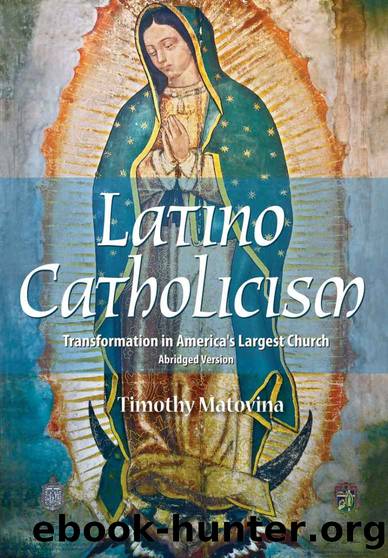Latino Catholicism (Abridged version): Transformation in America's Largest Church by Matovina Timothy

Author:Matovina, Timothy [Matovina, Timothy]
Language: eng
Format: epub
ISBN: 9780764868917
Publisher: Liguori Publications
Published: 2014-03-13T00:00:00+00:00
Challenges to Catholic Faith
Latinos and leaders who work with them in grass-roots Hispanic ministries face numerous difficulties. Most of these are in working-class Hispanic communities that have problems, including lack of opportunity, low educational attainment, drug and alcohol abuse, violence, teenage pregnancy, poverty, undocumented status, inadequate health care, and a strain on family cohesion and personal well-being. Hispanic-ministry proponents, however, have lamented that the upsurge of Pentecostalism and evangelicalism presents the most momentous challenge as they strive to preserve the faith of immigrants. At least as urgent is the need to invigorate faith among young Latinos as they become more enmeshed in a pluralistic U.S. society with a range of religious options, including no religion.
Research by Andrew Greeley in the late 1980s showed that 60,000 Hispanics in the United States âdefect[ed]â from Catholicism every year. His research and studies, like the 2002 National Survey of Latinos and 2007 Pew Latino religion survey, reveal that identification as Protestants varies across Hispanic groups, with Puerto Ricans, Salvadorans, and other Central Americans the most likely to identify as Protestants and ethnic Mexicans the least likely. A decade after his initial study, Greeley claimed that the situation had gotten worse, noting that the annual loss of Latinos is one-half of 1 percent.
Greeleyâs conclusion that the departure of Latinos is âthe worst defection in the history of the Catholic Church in the United Statesâ needs to be examined against the 2008 Pew Forum on Religion and Public Life (PFRPL) survey. It found that 10 percent of all U.S. residents were raised as Catholics but no longer describe themselves as Catholic, a loss of one-third of the Catholic faithful in adulthood. A CARA report confirmed that Euro-Americans accounted for 70 percent of those who self-identified as former Catholics on a 2003 survey, while Latinos accounted for only 20 percent. The 2006 Faith Matters survey found that the defection rate among âAngloâ Catholics is double that of Latino Catholics. Thus Hispanic patterns of affiliation reflect the long-standing pluralism and voluntarism that are characteristic of religion in the United States as well as a trend away from denominational loyalty and toward a religious culture of choice. Nonetheless, Greeley and others have rightly pointed to the departure of Latinos from Catholicism as a monumental pastoral predicament.
Most Latinos in the United States who leave Roman Catholicism have embraced Protestantism in its Pentecostal and evangelical forms. Such congregations range from Churches that stringently discipline their membership to those that accentuate the âprosperity gospelâ and its belief that God rewards the faithful with material blessings. The latter attract a number of Latino members. Hispanic-Catholic ministry leaders contend that Hispanics who are particularly prone to leave Catholicism for these Churches are those who have ascended to the middle class. These Churches offer them âjustification and celebration of their upward mobilityâ and âpersonal therapies to deal with their family and work problems.â
Immigrant, poor, and working-class Hispanics have become affiliated with Pentecostal and evangelical churches in even larger numbers. Some immigrants are not aware of denominational differences and do not realize they are in a Protestant congregation.
Download
This site does not store any files on its server. We only index and link to content provided by other sites. Please contact the content providers to delete copyright contents if any and email us, we'll remove relevant links or contents immediately.
The Lost Art of Listening by Michael P. Nichols(7494)
Why I Am Not A Calvinist by Dr. Peter S. Ruckman(4149)
The Rosicrucians by Christopher McIntosh(3513)
Wicca: a guide for the solitary practitioner by Scott Cunningham(3167)
Signature in the Cell: DNA and the Evidence for Intelligent Design by Stephen C. Meyer(3132)
Real Sex by Lauren F. Winner(3014)
The Holy Spirit by Billy Graham(2944)
To Light a Sacred Flame by Silver RavenWolf(2814)
The End of Faith by Sam Harris(2733)
The Gnostic Gospels by Pagels Elaine(2527)
Waking Up by Sam Harris(2454)
Nine Parts of Desire by Geraldine Brooks(2361)
Jesus by Paul Johnson(2352)
Devil, The by Almond Philip C(2325)
The God delusion by Richard Dawkins(2305)
Heavens on Earth by Michael Shermer(2278)
Kundalini by Gopi Krishna(2180)
Chosen by God by R. C. Sproul(2161)
The Nature of Consciousness by Rupert Spira(2104)
